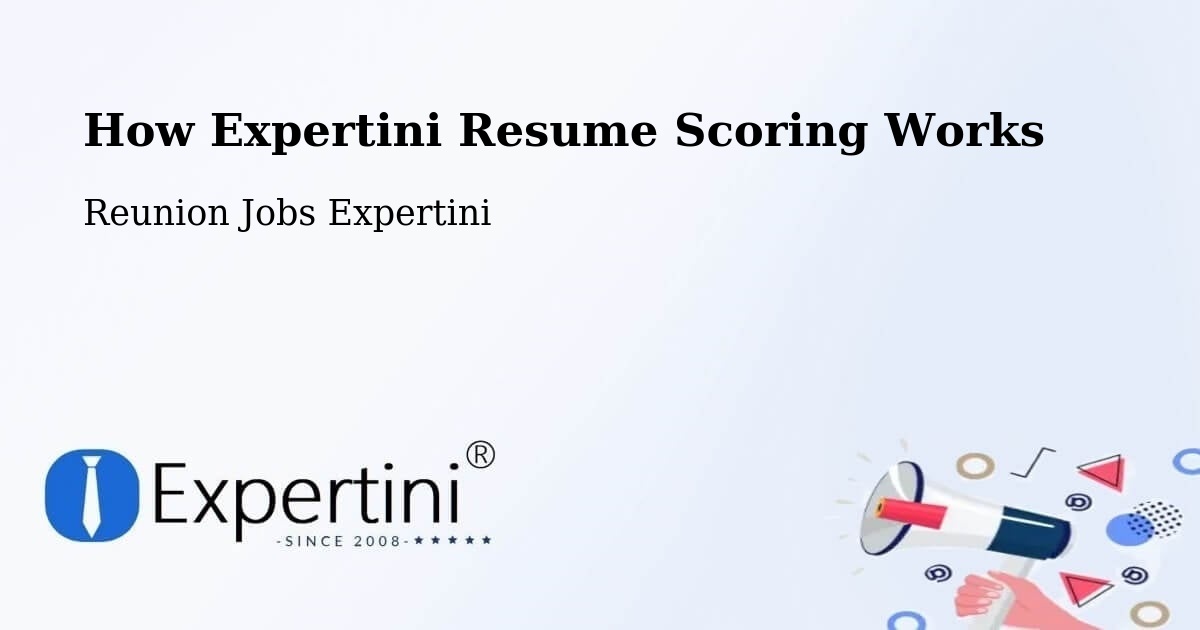How Expertini Resume Scoring Works

How Expertini Resume Scoring Works
Expertini’s resume scoring system is designed to bring transparency, fairness, and objectivity to candidate evaluation. The platform’s innovative technology leverages the latest advances in Natural Language Processing (NLP), deep learning, and data analytics, providing every resume with a quantifiable score between 0 and 100. This score represents how closely a candidate’s profile aligns with the core requirements and priorities of a given job, allowing recruiters and professional job seekers alike to instantly gauge fit and improve outcomes.
The Science of Resume Matching
Cosine similarity and NLP techniques power our 0-100 scoring system
Unlike legacy systems that depend on rigid keyword searches or manual screening, Expertini Resume Scoring uses advanced entity recognition, contextual understanding, and semantic analysis to interpret the true meaning and relevance of every section of a resume. Our models analyze not only hard skills but also soft skills, career trajectory, education, and experience, as well as unique achievements, certifications, and language proficiency.
Scores are generated dynamically for every application, reflecting both the requirements set by employers and evolving market data. The process is transparent: job seekers receive direct feedback on strengths and weaknesses, while employers are provided with explainable scoring breakdowns and evidence-based recommendations. The methodology is continuously validated and improved using anonymized outcome data and industry benchmarks, ensuring ongoing fairness and accuracy.
Key Components of Expertini Resume Scoring
- ✔️ Skills & Experience Analysis: Assesses alignment of core and niche skills, project history, and seniority with job requirements
- ✔️ Education & Certifications: Uses NLP-driven entity recognition to identify relevant academic and professional qualifications
- ✔️ Career Progression & Consistency: Evaluates stability, growth, and logical sequencing in the candidate’s career
- ✔️ Soft Skills & Context: Considers achievements, languages, and contextual signals using semantic analysis
- ✔️ Objective, Configurable Scoring: Employers can weight criteria for every job or campaign; system adapts to sector and region
- ✔️ Data-Driven & Audited: Scores are backed by explainable AI, continuous benchmarking, and user feedback
- ✔️ Semantic skills matching beyond keywords
- ✔️ Experience threshold validation
- ✔️ Credential recognition via NER
- ✔️ Consistency and quality indicators
Expertini's scoring model analyzes four key dimensions: Skills Match (using semantic NLP), Experience relevance, Education/Certifications, and Resume Consistency. The system converts resumes and job descriptions into high-dimensional vectors, then computes cosine similarity - a mathematical measure of textual similarity ranging from -1 (opposite) to 1 (identical). This value is mapped to our 0-100 scale, with 100 indicating perfect alignment.
-
How does Expertini ensure fairness and remove bias in resume scoring?
Expertini’s scoring system removes all personal identifiers, focusing solely on skills, experience, and relevant qualifications. The AI applies standardized evaluation criteria across all applicants, and continuous audits help detect and correct any bias in outcomes. Our explainable AI framework provides transparency, ensuring recruiters can understand and trust every score.
-
How are scores calculated and what do they mean for job seekers and employers?
Scores are the result of a multi-factor analysis that balances hard skills, soft skills, education, and relevant experience. A score near 100 indicates a close match to the role’s requirements, while lower scores signal a greater distance or missing criteria. For employers, this enables rapid and confident shortlisting; for job seekers, it offers clear, actionable feedback for career growth or application improvement.
Resume Scoring for Job Optimization
-
What's the mathematical basis for resume scoring?
Expertini's research team details the computational approach:
Vector Space Modeling
Cosine similarity calculates the cosine of the angle between vectors: cos(θ) = (A·B)/(||A|| ||B||). Scores approaching 1 indicate near-perfect alignment.
FAQs: Expertini Resume Scoring in Action


